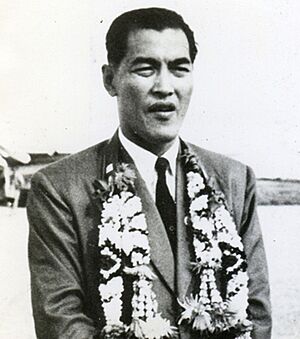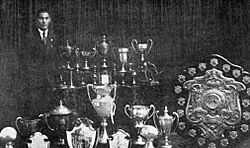Lee Wai Tong facts for kids

Lee in 1950
|
|||
| Personal information | |||
|---|---|---|---|
| Date of birth | 16 October 1905 | ||
| Place of birth | Tai Hang, Hong Kong Island, British Hong Kong | ||
| Date of death | 4 July 1979 (aged 73) | ||
| Place of death | St. Teresa's Hospital, Kowloon, British Hong Kong | ||
| Height | 1.80 m (5 ft 11 in) | ||
| Position(s) | Striker | ||
| Youth career | |||
| 1922 | South China | ||
| Senior career* | |||
| Years | Team | Apps | (Gls) |
| 1923–1925 | South China | ||
| 1926–1930 | Loh Hwa | ||
| 1931–1947 | South China | ||
| International career | |||
| 1923–1941 | China | 13 | (13) |
| Managerial career | |||
| 1926–1930 | Fudan University | ||
| 1934 | China | ||
| 1948 | China | ||
| 1954–1960 | Republic of China | ||
| 1966–? | Ming Chuan College (women) | ||
| *Club domestic league appearances and goals | |||
| Lee Wai Tong | |||||||||||||||
|---|---|---|---|---|---|---|---|---|---|---|---|---|---|---|---|
| Chinese | 李惠堂 | ||||||||||||||
| Jyutping | Lei5 Wai6 Tong4 | ||||||||||||||
| Cantonese Yale | Léih Waih Tòhng | ||||||||||||||
|
|||||||||||||||
Lee Wai Tong (born October 16, 1905 – died July 4, 1979) was a famous football player and coach from Hong Kong and China. He even became a Vice President of FIFA, the world's football governing body. Many people think he was the greatest Chinese footballer ever.
Lee Wai Tong helped the national team win several Far Eastern Games titles. He was also the team's captain for 13 years, from 1923 to 1936, without losing a single competitive game. This amazing streak ended at the 1936 Olympic tournament in Berlin.
He also had a very successful club career as a striker for South China in Hong Kong. He helped them win eight league titles, making them the top team in the area. After he stopped playing, he became a coach. He led the Republic of China national team to win the 1954 Asian Games. Lee Wai Tong was known as the "King of Asian Football." It is said he scored at least 1,260 goals in his 25-year career. Some even believe he scored closer to 2,000 goals!
Contents
Early Life and Football Beginnings
Lee Wai Tong was born in Tai Hang, Hong Kong. This was just outside the city. He was the third child of a construction company owner. When he was four, he moved to his parents' hometown of Ng-Wah County in Mei-Chow, Kwangtung, China.
His father was born in Hong Kong. His mother, Chen Qiongsheng, was from Hsiang-Shan, Kwangtung Province (now Zhongshan). In Mei-Chow, he learned to play football informally. Later, he moved back to Hong Kong. He then received formal football training at Queen's College, Hong Kong.
Lee Wai Tong's Playing Career
Club Football Success
Lee Wai Tong left school early to help his father's construction business. In 1922, he joined South China AA, a top football team in Hong Kong. He started as a youth player. He quickly moved up to the senior team by 1923. He showed he was a very talented striker.
Lee helped his club win the 1923–24 Hong Kong First Division League title. His skills became known internationally. He helped China win the gold medal at the 1925 Far Eastern Championship Games in Manila, Philippines. Chinese media called him the greatest Chinese footballer.
After these wins, Lee returned to China. He joined Fudan University in Shanghai as an athletic director. This allowed him to play for Loh Hwa. Loh Hwa was a team made up of players from different universities. They played in local and regional championships. These were the main yearly competitions in China back then.
In 1931, Lee came back to South China. He helped them win the 1932–33 Hong Kong First Division League title. They also won the league in 1934–35 and 1935–36. This was the first time they won the title two years in a row.
His football career was affected by the Second Sino-Japanese War and World War II. Lee kept playing for South China until Hong Kong was occupied by Japan. He managed to escape to Kwangtung (Guangdong). He joined the Chinese Army. During the war, he played exhibition games to raise money for the war effort. He was promoted to major general in the sports division. After the war, he returned to South China. He played for several more seasons before retiring in 1948 at age 43.
International Football Achievements
In May 1923, at just 17 years old, Lee was chosen for the China national team. He played in the football tournament at the 1923 Far Eastern Championship Games in Osaka, Japan. Even though he was young, his many goals at club level earned him a spot. This was the start of his amazing 20-year international career.
In the final match of the tournament, Lee scored three goals (a hat-trick) against Japan. China won 5–1 on May 24. At 17 years and 217 days old, he became the youngest player to score a hat-trick in an international game. This record still stands today. Only Pelé came close to breaking it. China won the championship, and Lee was seen as the young star. In the next tournament in 1925, Lee scored five goals. He scored two against Japan and three against the Philippines. This helped China win their sixth title in the competition.
As captain of China, his team went 13 years without losing a competitive game. This streak lasted from 1923 to 1936. Lee led China to their first ever Olympic tournament in 1936 in Berlin. They were one of the first Asian nations, along with Japan, to play in the Olympics.
Getting to the Olympics was a challenge. The Chinese government could only give 170,000 of the 220,000 yuan needed for the trip. So, the team played many friendly games against teams from other countries. These included Singapore, the Netherlands East Indies, and India. They played to raise the money needed for the trip. The team reached their goal. Lee then captained the team against Great Britain in the tournament.
In total, Lee played 13 matches for the China national team and scored 13 goals.
Management Career and Football Leadership
Lee Wai Tong first coached while he was still a player. He took a job at Fudan University when he played for Loh Hwa. He also captained the Chinese national team. Since the team did not have a full-time coach, Lee managed the team for the 1934 Far Eastern Championship Games. He also played in this tournament, which China won.
In 1948, the China national team asked Lee to be their coach again. This was for the 1948 Summer Olympics. He took the team on a three-month training trip to the Philippines and Thailand. They paid for this trip themselves. They were getting ready for the journey to London. At the Olympics, China played against Turkey in the first round and lost 4-0.
After the Olympics, Lee returned to China. The Chinese Civil War was happening then. He did not coach again until after the war. By then, the Chinese team had split into two. One was the Republic of China team (later called Chinese Taipei). The other was the People's Republic of China team.
In 1954, Lee became the first permanent coach for the Republic of China team. He led them to win the 1954 Asian Games. He continued to coach the team at the 1958 Asian Games. There, he guided them to win the tournament again, beating South Korea 3–2 in the final.
Besides coaching, Lee was also elected as a Secretary-General of the Asian Football Confederation in 1954. In 1965, he became the Vice President of FIFA. He was the first ethnic Chinese person to reach such a high position in FIFA.
Honours and Awards
Player
South China
- Hong Kong First Division: 1923–24, 1932–33, 1934–35, 1935–36, 1937–38, 1938–39, 1939–40, 1940–41
Republic of China
- Far Eastern Games: 1923, 1925, 1927, 1930, 1934
Manager
Republic of China
- Asian Games: 1954, 1958
 | Anna J. Cooper |
 | Mary McLeod Bethune |
 | Lillie Mae Bradford |


